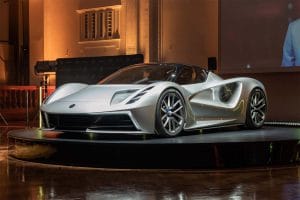Lotus and British energy company Centrica plc plan to use a new electric vehicle platform as the new model for future EV ownership that includes at home charging and energy storage.
The new partnership between Lotus and Centrica’s British Gas subsidiary will help establish a new global charging and energy infrastructure for new products as part of Lotus’ move to net-zero carbon following huge investment into the business since 2018.
“Our journey to net-zero carbon is absolutely lock-in-step with the Vision80 strategy for Lotus – taking us to 80 years of the business in 2028,” said Lotus Cars CEO Phil Popham.
(New Lotus Evija – 200 mph electric supercar will set you back $2 million.)
“By then we will have transformed Lotus into a truly global player in the high-performance high-technology sector with a new range of cars that remain true to our fundamental promise of always being ‘For The Drivers’. The difference is the energy and infrastructure that will power and support these products in the future – this new partnership demonstrates the progress being made and the ambition of our vision,” he said.

Lotus Cars CEO Phil Popham is looking to transform the company into an electrical leader in the industry.
Production of the all-electric Lotus Evija hypercar will start at the company’s famous Hethel, Norfolk headquarters later in 2020 – marking the start of Lotus’ shift to electrifying its growing range of vehicles.
The new strategic partnership sees the two companies embark on a multi-prong strategy, covering dedicated Lotus EV Energy strategy including de-carbonization, charging infrastructure serving Lotus’ global network and customers and a new energy product and platform integrating connected vehicles, homes and customers to support the growth in digital mobility lifestyle.
“Owning an electric vehicle isn’t the same as owning an internal combustion engine car,” said Carl Bayliss, vice president of Centrica Innovations.
(Lotus goes electric — but will that spark the brand’s revival?)
“We see a future where the customer, car and home are connected, enabling new services beyond charging the car, and new products and experiences replacing the unremarkable standard relationship with energy and the ownership of a car today,” Bayless said.

The Lotus Evija will use one motor per wheel, with a total 1,900 hp. And now you can charge it at home — or help power your home with it.
“Lotus is the perfect partner as we embark on this, given the recognition and appeal of the brand globally and the fact that it is right at the beginning of its electrification journey,” he said.
By making the car an extension of the home, capable of storing electricity, trimming emissions and generating new income by providing services to the energy market, the companies aim to redefine the customer relationship with cars – one controlled by smart devices at home and on the move.
The energy company will also facilitate a sustainability program that leverages innovative, low-carbon technologies, and helps mitigate the environmental impact of everything from manufacturing through to sales and the day-to-day activities of Lotus employees, helping meet Lotus’ carbon reduction aspirations.
(Lotus reveals 2020 Evora GT for North America.)
“We have set ambitious targets for trimming carbon emissions both our vehicles and our operations. Given the rate of change required and the importance of getting it right first time, the support of our strategic partner Centrica is going to be vital,” Bayliss said.

